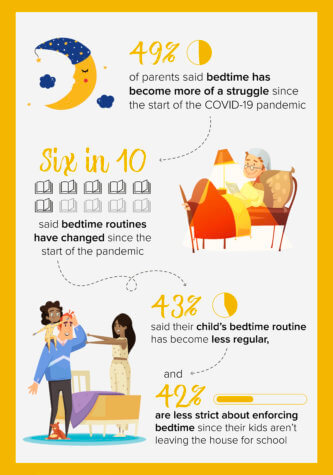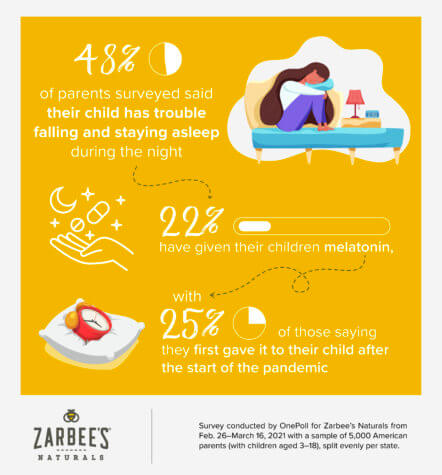NEW YORK — Having trouble getting to bed during the coronavirus pandemic? A new study finds it’s even tougher when you’ve got kids. Bedtime has become more of a struggle for half of American parents since the start of COVID-19, especially those living in Florida.
A new survey of 5,000 American parents (100 from each state) with children between three and 18 years-old reveals 49 percent have faced additional difficulties getting their little ones in bed since last March. This might be because 60 percent of parents say bedtime routines have inevitably changed due to the pandemic.

Forty-three percent add their child’s bedtime routine has become less regular since last March. Another 42 percent are less strict about enforcing bedtime since their kids aren’t leaving the house for school.
Commissioned by Zarbee’s Naturals and conducted by OnePoll, the survey also delved into the details of these bedtime battles. Researchers reveal bedtime routines don’t just differ from house to house, but differ from state to state.
Kids don’t like bedtime in the Sunshine State
With 100 parents surveyed per state, researchers find kids in Florida are the most likely to stay up past their bedtime during the week. Parents in Florida say, on average, their children stay up late on three weeknights. When they break their bedtime, it’s by an average of 33 minutes.
California and Colorado followed as the second and third states, respectively, where kids are most likely to stay up past their bedtime during the week. However, bedtime isn’t a struggle just in these states. Across all 50 states, parents said their child was most likely to stay up late once they hit the age of nine.
Furthermore, parents from Florida were also the most likely to say that it’s been a challenge getting their child to bed. Moms and dads there admit it turns into a struggle about three times per week. Parents in Louisiana and California followed Florida for the most amount of bedtime struggles. Meanwhile, parents in Washington are least likely to face a challenge when getting their child ready for bed (less than once per week).
“Bedtime can be a challenge because at the end of the day parents are tired. But helping a child get a good night’s sleep is one of the most important things we can do to support their well-being. Even if kids know sleep is important, they don’t always have the maturity and executive functioning skills to prioritize a good night of sleep,” says Dr. Kelly Fradin, a pediatrician and partner of Zarbee’s Naturals, in a statement.
“With all of the change in the past year, it’s helpful to maintain a consistent bedtime every night to promote the physiology of healthy sleep. A bedtime routine, limiting screen time before bed and making time and space for physical activity can also help. Parents can also consider trying melatonin as a tool to support sleep.”

Can melatonin ease the bedtime battles?
As if getting children to fall asleep wasn’t hard enough, having them actually stay asleep can be the next hurdle. Nearly half the poll (48%) said their child has trouble falling and staying asleep during the night. To help children adjust to new schedules, a fifth of parents (22%) have given their children melatonin. A quarter of these parents say they first gave it to their child after the start of the pandemic.
“With all the adjustment to our routines over the past year, supporting sleep is one of the most important things you can do to help your child be well mentally and physically,” Dr. Fradin adds. “Melatonin is a helpful tool to bridge the gap in adjusting to new sleep patterns.”
For parents who’ve given their child melatonin, many said it helped their child fall asleep more quickly (68%), helped improve their overall quality of sleep (55%), and helped them to stay asleep throughout the night (48%).
